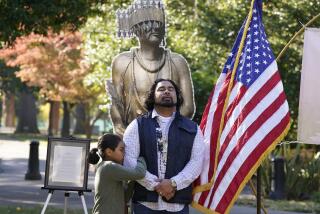Brazilian Tribe Strives to Keep Ancient Traditions Alive
PANAMBIZINHO, Brazil — As Western culture closes in, a small tribal group from the Guarani-Kaiowa Indians clings to traditional ways. Life has changed little down the centuries at Panambizinho, a 150-acre reservation that is home to 258 Guarani-Kaiowa in southwestern Brazil.
Warriors with painted faces and pierced lips guard the entrance, bows and arrows at the ready.
“Here we are only Guarani-Kaiowa. We are not influenced by the religion of the white man,” says Nelson Conscianca, 62. “Not that I have anything against the white man’s religion; just that it’s not our way.”
Nelson’s father, chief Lauro Conscianca, is a guardian of Guarani-Kaiowa traditions--with a small concession to Western style.
In wraparound sunglasses, a feather headdress and a piece of clear plastic protruding from his lower lip, the 87-year-old chief shakes a rattle and begins to sing.
The rest of the tribe joins him. The women thump hollowed logs on the ground. The men join in, shaking rattles and singing.
The children tumble over one another, laughing with a glee that is largely absent from other Guarani-Kaiowa reserves, where suicide and murder are rampant.
The Panambizinho group simply wants to live as the Guarani-Kaiowa always have. But the old chief knows that is no longer possible.
“The forest is cut down,” he laments. “You have to walk for days to find a tapir or armadillo to eat. The plants to make medicines for earaches and headaches are gone.”
Even the land may be gone. Farmers have settled on much of the 3,000 acres recently awarded the tribe by the Federal Indian Bureau, and legal challenges could keep the Indians off it indefinitely.
Nor is Panambizinho immune to the wave of suicides. The chief has lost two sons, each time when it seemed likely that the group would be forced off their land.
“For me, I just want the land that is rightfully ours so I can live and pray,” he says. “But for the children, I worry about the future.”
More to Read
Sign up for Essential California
The most important California stories and recommendations in your inbox every morning.
You may occasionally receive promotional content from the Los Angeles Times.










